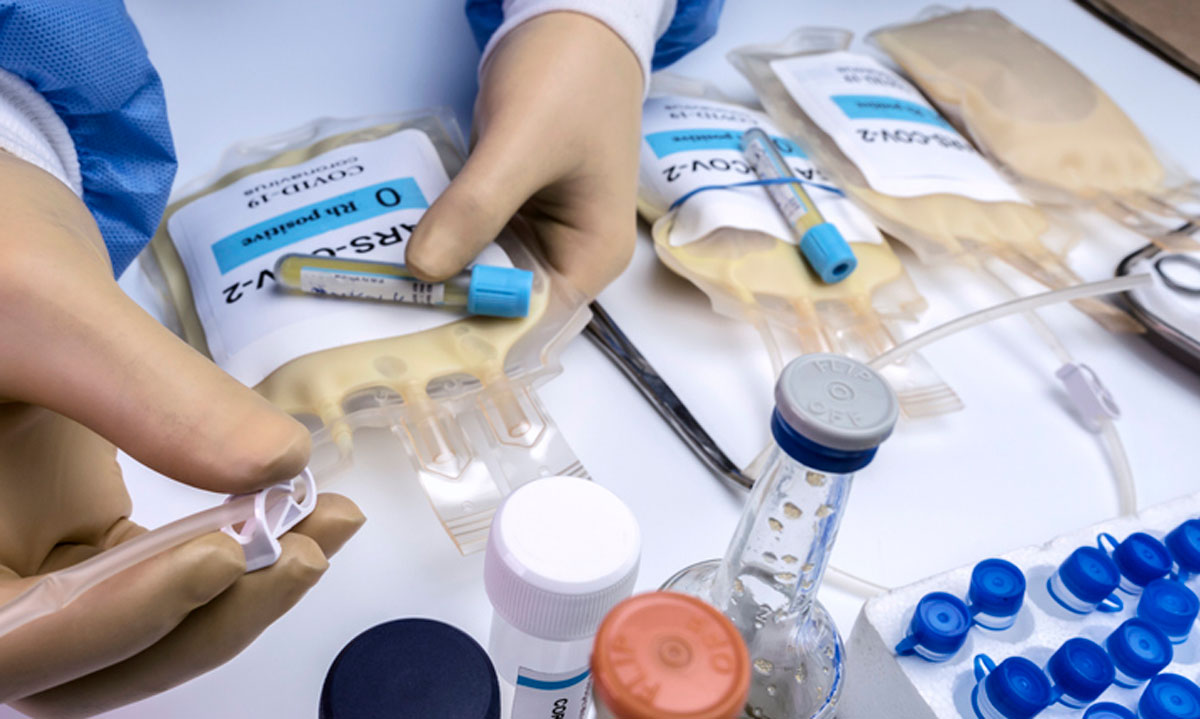
After participating in a Mayo Clinic-led expanded access protocol (EAP) program earlier this year, ARUP and University of Utah Health continue to research the safety and efficacy of COVID-19 convalescent plasma (CCP) in four multicenter randomized clinical trials led by Johns Hopkins University, Stanford University, and Vanderbilt University.
The initial data from the Mayo EAP suggested that CCP, at least in the short term, is safe, but researchers don’t know if it truly works at this time, said Ryan Metcalf, MD, medical director of ARUP Blood Services and U of U Hospital Transfusion Services.
However, Emily Spivak, MD, MHS, associate professor of medicine in the U of U Division of Infectious Diseases, explained that it is important to study CCP in defined clinical trials. “The EAP data, while promising, was uncontrolled, and there was no way to definitively draw conclusions about the efficacy of the therapy.”
The multicenter trials that ARUP and U of U Health are involved in plan to enroll 500 to 1,000 individuals and aim to provide statistically significant data about the safety and efficacy of CCP treatment in different patient populations and clinical scenarios.
“The overarching goal is to see if CCP given early in infection can prevent progression to worse disease, or if CCP given to those who have been exposed to SARS-CoV-2 can prevent symptomatic disease. It is very important that we find outpatient therapies to try and prevent progression to severe disease and hospitalization,” said Spivak.
Convalescent plasma has been used for over 100 years in various diseases and clinical contexts, including its recent use for COVID-19, explaine Metcalf. “However, even though it has been around for a long time, we haven’t actually had a lot of published evidence supporting its safety and efficacy,” said Metcalf.
In September, ARUP joined Johns Hopkins University to study patients who have a confirmed close-contact exposure (as defined by the CDC) to a person with COVID-19. The study’s objective is to determine the safety and efficacy of treatment with high-titer CCP as postexposure prophylaxis. “The question this trial aims to answer is, if CCP is administered after a high-risk exposure to SARS-CoV-2, can we decrease the likelihood of infection?” Metcalf said.
Another Johns Hopkins study is investigating patients who have confirmed cases of COVID-19, as determined by nucleic acid diagnostic testing, and exhibit symptoms of disease but are not sick enough to be hospitalized. “For this study, the goal is to determine if CCP can prevent symptomatic outpatients from progressing to the point of hospitalization or death,” said Metcalf.
The Stanford University-sponsored clinical trial is studying symptomatic patients with suspected or confirmed COVID-19 who present to an emergency department but are not sick enough to be admitted to the hospital. “The hope is that we might see that CCP reduces the number of patients who develop serious symptoms,” said Metcalf.
ARUP is also working with Vanderbilt University on a clinical trial investigating CCP efficacy and safety in hospitalized patients with confirmed COVID-19. “Similarly, we really want to see if CCP can decrease the severity of disease or [disease] duration in patients who have been admitted to the hospital,” explained Metcalf.
Currently, ARUP has enrolled over 25 patients in these clinical trials and is one of the top enrolling centers for the Vanderbilt study.
Clinical trials are complicated, particularly when dealing with blood, which is complex from an operational, clinical, and regulatory standpoint. “In addition to the complexity of the trials themselves, we are proud of our trial enrollment, since we are also involved in EUA [Emergency Use Authorization] distribution of CCP,” explained Metcalf. “All told, there are five ways that patients at the University of Utah could receive CCP, and we are responsible for juggling multiple inventories and processes to ensure that the right patients receive the right product at the right time.”
Dr. Metcalf believes the data gained by the continued distribution and study of CCP will be worth the herculean effort, both now and in the future. “When the pandemic began, experts looked to historical studies for information about convalescent plasma. We were able to learn from the past, but there really wasn’t a great deal of data or strong evidence. It is my hope that our work now will not only provide essential information for the COVID-19 pandemic but will also provide useful information for future pandemics, such as good evidence of a precedent for actual safety and efficacy,” said Metcalf.

Listen to an episode of the LabMind podcast to hear Brian Jackson, MD, interview Ryan Metcalf, MD, about the convalescent plasma therapy for COVID-19.
















